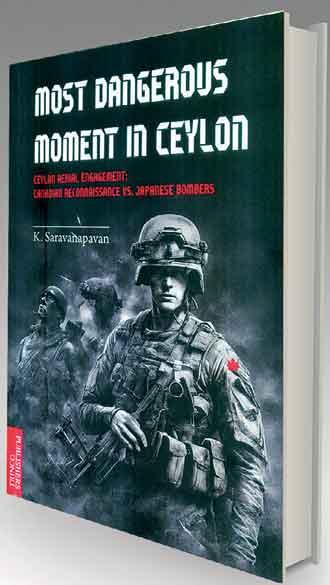Reply To:
Name - Reply Comment
 The role of the Canadian Air Force to save Ceylon from an impending military disaster at the height of World War II has been brought to the limelight in author K. Saravanapavan’s latest book ‘The Most Dangerous Moment in Ceylon – Ceylon Aerial Engagement : Canadian Reconnaissance Vs. Japanese Bombers’.
The role of the Canadian Air Force to save Ceylon from an impending military disaster at the height of World War II has been brought to the limelight in author K. Saravanapavan’s latest book ‘The Most Dangerous Moment in Ceylon – Ceylon Aerial Engagement : Canadian Reconnaissance Vs. Japanese Bombers’.
The book describes how the Japanese Royal Navy and Air Force attempted to ‘shatter the tranquility of Ceylon’ on April 5, 1942 and again on April 9. It was during this time that the Canadian forces had integrated with the British; where Canadian Captain Leonard Birchall warned the British headquarters in Colombo to thwart a potential disaster. His actions bear testament to not only being vigilant during warfare, but also underscore the ‘significance of unity and shared intelligence in the face of adversity’.
This historical narrative portrayed by author Saravanapavan not only recounts historical events, but also pays tribute to the spirit of cooperation and resilience that defined the Allied response to the Axis onslaught. With accounts of bravery and strategic foresight the book also acknowledges personal sacrifices made by those who served far from their homeland, united in a common cause for a
better world.
Former Prime Minister of the United Kingdom Winston Churchill described this event as not only the most dangerous moment of the war but ‘the moment that caused him the greatest alarm when the Japanese Fleet was heading towards Ceylon and the naval base. In one of his recollections on this event, Churchill further states that the capture of Ceylon and the consequent control of the Indian Ocean and the possibility at the same time of a German conquest of Egypt would have ‘closed the ring and the future would have been black.’
The author had comprehensively analysed all events that unfolded during this period in the year 1942 and the book is an absolute page-turner for anybody interested in the military history of the then Ceylon, World War II and how Ceylon maintained geopolitical relations at the time.